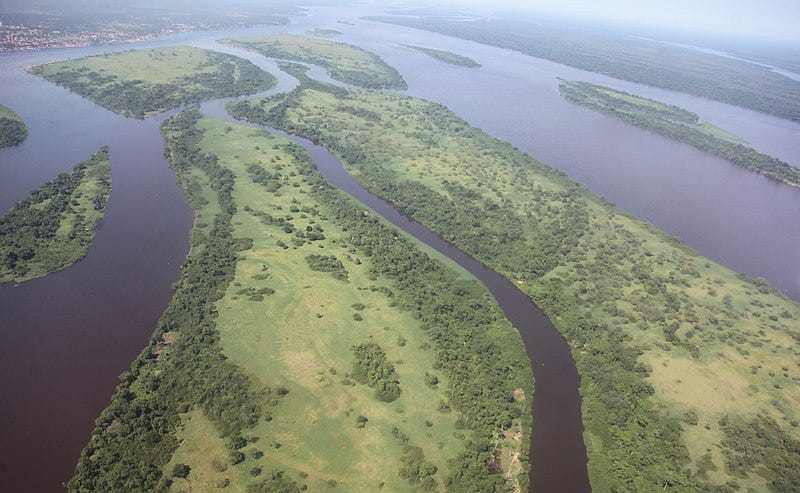🔅 Namibia Critiques Germany's Israel Stance & Lisbon Unveils Its Slave Trade Past
De Beers' Billion-Dollar Underground Bet & Zambia's Unique Cholera Strategy
Photo of the Day

Brief & Bright: Africa's Top Five
Namibia's Callout: Germany's Double Standard on Israel and Gaza?
Namibia is not pleased with Germany, its former colonial ruler, for siding with Israel in a case brought by South Africa at the International Court of Justice, alleging Israel's committing genocide in Gaza. Namibia's take? That's a big no-no. President Hage Geingob is basically saying, "Hey Germany, remember when you acknowledged committing genocide in our backyard between 1904 and 1908? Maybe sit this one out." German colonisers massacred more than 70,000 Herero and Nama people between 1904 and 1908. Historians consider this to be the 20th Century's first genocide. He's calling out Germany for what he sees as a contradiction: claiming to be against genocide but supporting Israel in this case. Germany, on the other hand, is standing firm. They're calling the accusations against Israel baseless and a "political instrumentalisation" of the UN genocide convention. Germany's angle is shaped by its own history, particularly the Holocaust, and they're defending Israel's actions as self-defence.
Lisbon's Plaque Project: Unsilencing History One Square at a Time

Welcome to Lisbon, the city known for its picturesque views and custard tarts that is now turning the spotlight on a less savoury part of its past: its role in the transatlantic slave trade. For years, Portugal's history classes have been giving the country's colonial past the Instagram filter treatment, showing it as a source of pride while glossing over the darker chapters. But now, Lisbon is stepping up by installing 20 plaques across the city, highlighting the untold stories of the over six million Africans forcibly shipped off to slavery by Portuguese sailors. Take a stroll to Terreiro do Paco, one of the city's main squares, and you'll find a plaque marking where many enslaved Africans disembarked, a sobering reminder of a history often left out of the textbooks. Then there's Rossio Square, which turns out was a historical hub for the Black community. These plaques, ready since 2020 but delayed by everything from budget woes to mayoral musical chairs, are part of a larger effort to acknowledge Lisbon's, and by extension, Portugal's, complicated history. It's about time, too, considering Europe's top human rights group has been nudging Portugal to face its colonial past head-on. Activists are pushing for more than just plaques, though. They're talking reparations, public policies, and, hey, maybe even a museum dedicated to African history.
De Beers' Billion-Dollar Bet: Going Underground in Botswana

De Beers is doubling down in Botswana with a cool $1 billion. Why? To transform its Jwaneng mine into an underground treasure trove. The company, a name synonymous with sparkly rocks, and the Botswana government are co-owners of the Debswana Diamond Company and are betting big on this project, thus keeping Jwaneng, which is already a diamond superstar, in the game for another 11 years starting from 2024. Now, you might wonder, "Why dig deeper when diamond demand is as low as my bank account after the holidays?" Well, the world's supply of bling is also dwindling. De Beers CEO Al Cook is like the optimistic gambler at the casino. He's looking at the long game, betting that the global thirst for diamonds will bounce back at some point.
Hichilema's Unconventional Solution to Zambia's Cholera Crisis
Zambia's President Hakainde Hichilema has a plan to tackle the country's cholera outbreak, and it's not what you'd expect. He's urging folks to ditch the hustle and bustle of urban life and head for the hills - or rather, the villages. With about 300 lives lost to cholera and over 7,500 cases reported, Hichilema's reasoning is that cities are getting too crowded, and it's like a welcome party for cholera with poor sanitation in these densely populated areas. In 24 hours last week alone, more than 500 new cases and 17 deaths were reported, and the disease is playing tag across eight of Zambia's ten provinces. Neighboring Mozambique and Zimbabwe are on high alert to keep the disease from crossing borders. Zimbabwe's already in the ring with its own cholera battle, thanks to a lack of clean water. Cholera's a nasty bugger, spread by contaminated water or food, and it doesn't play nice – severe dehydration, vomiting, diarrhoea, and it can be fatal in a flash if untreated.
Congo River Floods: Historic Highs, Widespread Devastation
The Congo River, a lifeline for millions, has surged to its highest levels in over six decades, unleashing floods that have wreaked havoc across the Democratic Republic of Congo (DRC) and the Congo Republic. The disaster has claimed over 300 lives in recent months, spotlighting the region's vulnerability to climate change-induced weather extremes. The river, hitting a near-record 6.20 meters, reflects the impact of exceptionally heavy inland rains. The urgent call is for residents near the river to relocate to safer areas. Kinshasa, with its dense population, has seen several neighbourhoods submerged alongside widespread flooding in over a dozen provinces. The devastation is stark: nearly 300 fatalities, 300,000 households impacted, and countless homes destroyed. Across the river, the Congo Republic reports at least 17 deaths, with over 60,000 households affected in areas including the capital, Brazzaville. The crisis is compounded by inadequate urban planning and poor infrastructure, leaving communities defenceless against sudden floods. As waters rise, residents resort to makeshift boats to navigate the submerged streets, now choked with plastic waste and debris.
Food for Thought
“During times of peace in the country, the chief does not carry a shield."
— Ugandan Proverb






